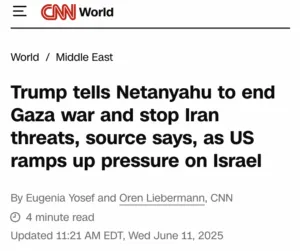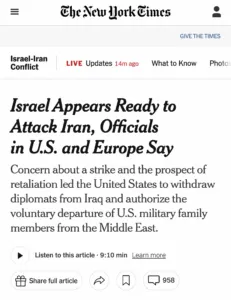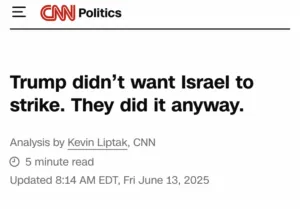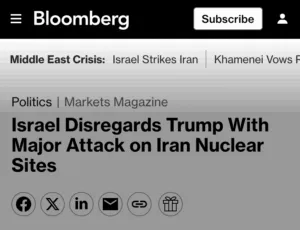RSS
Big Surprise: The Media Uses Its Platform to Side with Iran’s Terrorist Regime Over Israel

Firefighters work at the scene of a damaged building in the aftermath of Israeli strikes, in Tehran, Iran, June 13, 2025. Photo: Majid Asgaripour/WANA (West Asia News Agency) via REUTERS
Below is a troubling timetable of how the media reported the first few days of the war between Israel and Iran:
Thursday, June 12 – Friday, June 13: A Multi-Pronged Assault to Cripple Iran’s Nuclear Program
In the early hours of Friday, June 13, Israel launched Operation Rising Lion, a sweeping, coordinated offensive against Iran’s nuclear infrastructure and the officials overseeing it.
The operation marked a decisive move against the Islamic Republic’s military capabilities, unfolding as a bold, surgical campaign whose execution appears to have been years in the making, with final preparations reportedly completed during the past eight months.
The IDF, Mossad, and Israel’s defense industries collaborated on a meticulously synchronized, three-pronged assault deep inside Iranian territory.
In the hours before the strike, the global media fixated on rising tensions following a damning report from the UN’s International Atomic Energy Agency (IAEA), confirming Iran’s violation of key non-proliferation obligations. In defiance, Tehran responded not with restraint, but with escalation, announcing a new uranium enrichment facility and the activation of advanced centrifuges designed to accelerate weapons-grade production.
Despite Israel’s patience and precautions and Iran’s brazenness, much of the international media framed Israel’s actions as destabilizing.
Media Briefings, Misdirection, and a Green Light
The media’s false judgment of Israel relied on reports that President Donald Trump had urged Israeli restraint in the days leading up to the assault, preferring renewed nuclear diplomacy.
CNN reported that Trump had warned Prime Minister Netanyahu to “stop Iran threats,” claiming the US was “ramping up pressure” on Israel to hold off on any military action.

The New York Times echoed this, framing Israel as “ready to attack Iran” in a move that could, they claimed, “further inflame” the region and derail US diplomacy.

The Washington Post ran with the headline “Fears of an Israeli Strike on Iran,” citing unnamed US intelligence officials who were “increasingly concerned” that Israel would act “without the consent of the United States,” a move they claimed would doom diplomatic efforts and provoke Iranian retaliation against US assets in the region.
Oddly, those same outlets also reported Iranian threats, including a warning by Defense Minister Aziz Nasirzadeh that it could strike US bases if talks collapsed — yet these were treated with far less alarm.
What none of the reporting made clear at the time, but has since been confirmed, is that these supposed leaks and briefings about US reluctance were part of a coordinated misdirection campaign designed to mislead Tehran.
In an interview with Reuters on Friday, President Trump pulled back the curtain: “We knew everything,” he said, calling the Israeli strikes “excellent” and “very successful.” Israeli officials confirmed the US had been briefed in advance and had given quiet approval, though it withheld direct military support.
Friday, June 13: Media Cries “Rogue Israel” Before Iran Responds by Targeting Civilians
Despite the confirmation from Trump, much of the media clung to the narrative of a defiant, unilateral Israel.
CNN’s Kevin Liptak, for example, published an analysis claiming Israel had “ignored direct warnings” from Trump and acted without US involvement, describing the strikes as “against the president’s publicly stated wishes.” The irony, of course, is that these “publicly stated wishes” were never meant to reflect the truth — they were part of the ruse. Liptak, like many others, appeared to mistake strategic misdirection for a diplomatic breakdown.

The Conversation published a breathless analysis accusing Israel of “defying Trump” and “risking a major war.” One is left to wonder: what exactly does The Conversation consider a risk? Iran stockpiling enriched uranium, threatening regional annihilation, and publicly vowing to strike Israel apparently doesn’t meet their threshold. Only Israel’s preemptive attempt to stop it does.
Bloomberg took a similar line, claiming Israel had “expressly disregarded the wishes of Trump” — even as Trump himself, just hours later, confirmed US foreknowledge and praised the mission’s success.

At approximately 9:00 p.m. Friday, Iran responded, not with a measured military reply, but with indiscriminate missile barrages targeting civilian centers.
And yet, media coverage remained locked on the same refrain: that Israel was the destabilizing party, even as missiles rained down on apartment buildings, while the regime responsible for launching them was portrayed as merely the victim of someone else’s war.
Saturday, June 14 – Sunday, June 15: Israel Continues, and Iranian Missiles Kill More Civilians
Operation Rising Lion continued through Saturday, with US officials reportedly assessing the strike on Iran’s Natanz nuclear facility as “extremely effective.” On June 14, Israel expanded its campaign, targeting weapons sites and critical energy infrastructure, aiming to degrade Iran’s ability to fund, fuel, and sustain its nuclear and military operations.
Once again, the Iranian regime responded not with military countermeasures, but with another wave of indiscriminate missile attacks on Israeli population centers — Bat Yam, Rishon Lezion, and Haifa.
And yet, this simple fact — this fundamental asymmetry — has been ignored, downplayed, or erased by many in the global media.
This is not a war between two belligerent nations targeting one another’s cities. It is a preemptive strike by a democracy against the world’s most prolific state sponsor of terrorism, and the inevitable response from that regime: the mass targeting of Israeli civilians, just as it has always promised to do.
The New York Times, which has devoted entire front pages to Gazan casualty figures, often sourced solely from Hamas, could not find space for a single headline acknowledging Israeli deaths. Not one. An entire homepage dedicated to the war, and no room for Israeli victims.
10 Israelis are dead. 200 are injured.
But you won’t see that in any @nytimes headlines today.
Because Israeli casualties evidently don’t count for The New York Times. pic.twitter.com/56jpVqwhAz
— HonestReporting (@HonestReporting) June 15, 2025
The Washington Post, The Guardian, and wire services like AFP have leaned heavily on the language of equivalency — describing “trading strikes,” “tit-for-tat attacks,” and an “exchange of missiles.”
What they omit is that one side (Israel) is striking military targets. The other (Iran) is deliberately targeting children in their homes.
This is not two sides “trading strikes.”
While Israel targets the Iranian regime, the Islamic Republic fires its missiles at Israeli civilians.
Enough with the moral equivalence, @washingtonpost. pic.twitter.com/cUxjPJP8ZX
— HonestReporting (@HonestReporting) June 15, 2025
The Guardian even speculated that Israel might expand its operations “beyond” the nuclear program, ignoring that Israel has been transparent about its objectives and precise in how it has carried them out.
Newsweek accused Israel of “escalating” the conflict for conducting precision strikes on underground nuclear facilities and weapons depots — but didn’t say anything about Iran, which launched ballistic missiles at apartment buildings.
The Context Matters
Yes, Israel struck first –but this was a preemptive strike against a regime that has made no secret of its ambition to destroy the Jewish State.
Just two days before Israel acted, the United Nations confirmed Iran was violating its nuclear obligations and moving closer to weapons-grade enrichment. Tehran responded by threatening to attack US forces in the region.
This is the same regime that funds and arms terrorist proxies across the Middle East: Hamas, Hezbollah, and the Houthis — all of which have escalated attacks on Israel since October 7, 2023, and all of which are also openly committed to Israel’s destruction.
It is also the same regime that has targeted Western civilians. In 2022, the head of the UK’s MI5 revealed that British authorities had foiled more than 20 Iranian-backed plots targeting UK citizens. These plots, he said, frequently involved Iran’s use of international criminals as proxies — a tactic seen across Europe.
The Bottom Line
This war was not inevitable. It was engineered by a regime that has spent decades plotting Israel’s destruction, funding terror across the region, and defying every international safeguard against nuclear proliferation.
Israel’s strike was not reckless. It was necessary, strategic, and aimed entirely at military infrastructure and personnel. Iran’s response, true to form, has been to fire missiles indiscriminately at Israeli civilian centers.
Yet much of the global news media has recast this as a clash between moral equals, drawing a false equivalence that erases the line between aggression and defense, between terrorism and counterterrorism.
The world’s most dangerous regime is watching closely to see whether its atrocities will be condemned or excused. And thanks to most of the media, it may already have its answer.
The author is a contributor to HonestReporting, a Jerusalem-based media watchdog with a focus on antisemitism and anti-Israel bias — where a version of this article first appeared.
The post Big Surprise: The Media Uses Its Platform to Side with Iran’s Terrorist Regime Over Israel first appeared on Algemeiner.com.
RSS
After False Dawns, Gazans Hope Trump Will Force End to Two-Year-Old War

Palestinians walk past a residential building destroyed in previous Israeli strikes, after Hamas agreed to release hostages and accept some other terms in a US plan to end the war, in Nuseirat, central Gaza Strip October 4, 2025. Photo: REUTERS/Mahmoud Issa
Exhausted Palestinians in Gaza clung to hopes on Saturday that US President Donald Trump would keep up pressure on Israel to end a two-year-old war that has killed tens of thousands and displaced the entire population of more than two million.
Hamas’ declaration that it was ready to hand over hostages and accept some terms of Trump’s plan to end the conflict while calling for more talks on several key issues was greeted with relief in the enclave, where most homes are now in ruins.
“It’s happy news, it saves those who are still alive,” said 32-year-old Saoud Qarneyta, reacting to Hamas’ response and Trump’s intervention. “This is enough. Houses have been damaged, everything has been damaged, what is left? Nothing.”
GAZAN RESIDENT HOPES ‘WE WILL BE DONE WITH WARS’
Ismail Zayda, 40, a father of three, displaced from a suburb in northern Gaza City where Israel launched a full-scale ground operation last month, said: “We want President Trump to keep pushing for an end to the war, if this chance is lost, it means that Gaza City will be destroyed by Israel and we might not survive.
“Enough, two years of bombardment, death and starvation. Enough,” he told Reuters on a social media chat.
“God willing this will be the last war. We will hopefully be done with the wars,” said 59-year-old Ali Ahmad, speaking in one of the tented camps where most Palestinians now live.
“We urge all sides not to backtrack. Every day of delay costs lives in Gaza, it is not just time wasted, lives get wasted too,” said Tamer Al-Burai, a Gaza City businessman displaced with members of his family in central Gaza Strip.
After two previous ceasefires — one near the start of the war and another earlier this year — lasted only a few weeks, he said; “I am very optimistic this time, maybe Trump’s seeking to be remembered as a man of peace, will bring us real peace this time.”
RESIDENT WORRIES THAT NETANYAHU WILL ‘SABOTAGE’ DEAL
Some voiced hopes of returning to their homes, but the Israeli military issued a fresh warning to Gazans on Saturday to stay out of Gaza City, describing it as a “dangerous combat zone.”
Gazans have faced previous false dawns during the past two years, when Trump and others declared at several points during on-off negotiations between Hamas, Israel and Arab and US mediators that a deal was close, only for war to rage on.
“Will it happen? Can we trust Trump? Maybe we trust Trump, but will Netanyahu abide this time? He has always sabotaged everything and continued the war. I hope he ends it now,” said Aya, 31, who was displaced with her family to Deir Al-Balah in the central Gaza Strip.
She added: “Maybe there is a chance the war ends at October 7, two years after it began.”
RSS
Mass Rally in Rome on Fourth Day of Italy’s Pro-Palestinian Protests

A Pro-Palestinian demonstrator waves a Palestinian flag during a national protest for Gaza in Rome, Italy, October 4, 2025. Photo: REUTERS/Claudia Greco
Large crowds assembled in central Rome on Saturday for the fourth straight day of protests in Italy since Israel intercepted an international flotilla trying to deliver aid to Gaza, and detained its activists.
People holding banners and Palestinian flags, chanting “Free Palestine” and other slogans, filed past the Colosseum, taking part in a march that organizers hoped would attract at least 1 million people.
“I’m here with a lot of other friends because I think it is important for us all to mobilize individually,” Francesco Galtieri, a 65-year-old musician from Rome, said. “If we don’t all mobilize, then nothing will change.”
Since Israel started blocking the flotilla late on Wednesday, protests have sprung up across Europe and in other parts of the world, but in Italy they have been a daily occurrence, in multiple cities.
On Friday, unions called a general strike in support of the flotilla, with demonstrations across the country that attracted more than 2 million, according to organizers. The interior ministry estimated attendance at around 400,000.
Italy’s right-wing government has been critical of the protests, with Prime Minister Giorgia Meloni suggesting that people would skip work for Gaza just as an excuse for a longer weekend break.
On Saturday, Meloni blamed protesters for insulting graffiti that appeared on a statue of the late Pope John Paul II outside Rome’s main train station, where Pro-Palestinian groups have been holding a protest picket.
“They say they are taking to the streets for peace, but then they insult the memory of a man who was a true defender and builder of peace. A shameful act committed by people blinded by ideology,” she said in a statement.
Israel launched its Gaza offensive after Hamas terrorists staged a cross border attack on October 7, 2023, killing some 1,200 people and taking 251 people hostage.
RSS
Hamas Says It Agrees to Release All Israeli Hostages Under Trump Gaza Plan

Smoke rises during an Israeli military operation in Gaza City, as seen from the central Gaza Strip, October 2, 2025. Photo: REUTERS/Dawoud Abu Alkas
Hamas said on Friday it had agreed to release all Israeli hostages, alive or dead, under the terms of US President Donald Trump’s Gaza proposal, and signaled readiness to immediately enter mediated negotiations to discuss the details.


